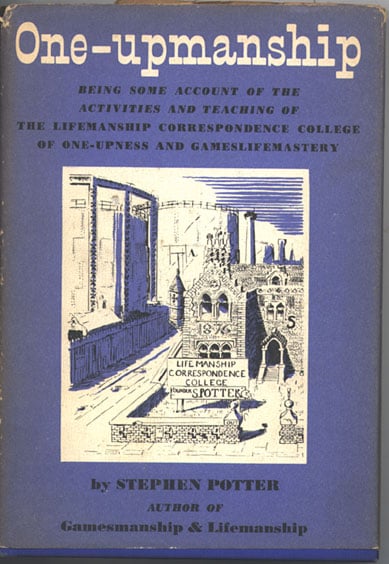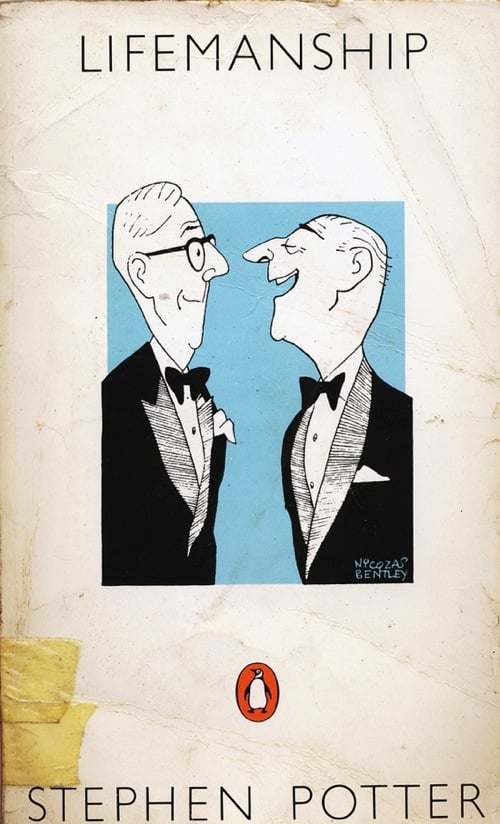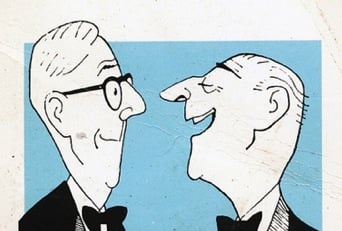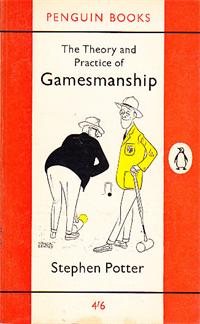Nobrowmanship
By:
March 5, 2011

The question of maintaining high self-esteem amid a harsh recession, and potentially a jobless recovery, is a critical one. Fortunately, at a wedding not too long ago, a friend quoted the English writer Stephen Potter (1900-1969) on the topic. Potter, he said, suggested that when you find yourself outmatched in a conversation about a particular foreign country, you could achieve a leg up on your opponent, imply great secret reservoirs of knowledge, and derail the conversational flow entirely with the simple phrase, “Yes, but not in the south.” This struck me as sound, and I immediately set out to find the cheapest used copy of the book he had referenced, Lifemanship. Within four days, I had devoured that, along with Potter’s other advice books, Gamesmanship, One-upmanship, and Supermanship, all written in the ’40s and ’50s.
Potter’s philosophy in writing these books was simple: “If you’re not one up, you’re one down.” The thinking is, if you can’t top an opponent (everyone is an opponent) honestly — by, for instance, knowing anything or being good at anything — you can employ a series of gambits to subtly undermine, disrupt or annoy him to give yourself the advantage, all without seeming like that was your goal all along. The desired state is “one-upness,” which is sort of a nirvana for petty individuals.

In Gamesmanship, Potter’s first book of the series, which focuses on sports, he strikes a note that carries through the rest of his work. “In general,” he writes, “the rule holds — LET YOUR ATTITUDE BE THE ANTITHESIS OF YOUR OPPONENT’S; and let your manner of expressing this different attitude put him in the wrong.” For example, if your snooker opponent is a great showman, affect an air of modest anonymity; be appreciative, even, of his antics; then quietly play your shot, so that the audience begins to say, ‘I prefer G’s game. He gets on with it anyway… Per contra, when in play against a dour opponent, who studiously avoids all reaction to the audience… then by all means be the ‘chap who doesn’t care a damn.’” Furthermore, if you’re the chap who doesn’t care, and you’re playing well for some reason, maintain cheerfully that each good shot must be sheer luck. “He is likely to feel an ebbing of confidence if he can be made to believe that it is not your play… but Fate, which is against him.”
This is devastating, and also works exceedingly well in Scrabble.
If you find yourself at a social function where a certain measure of decorum is called for, and an opponent is skillfully holding forth and attracting too much positive notice, Potter suggests several options. One is invoking the aforesaid phrase, “Yes, but not in the south” when the opponent is discussing a foreign country. By doing this, writes Potter, “Without any special knowledge, without any education whatsoever, it is possible not only to keep going in conversation, but, sometimes, throw grave doubts on the value of expert knowledge in general.” Another gambit, dubbed “glaciation,” involves freezing an entire conversation, leaving your opponent feeling awkward. If he is telling a funny story, don’t attempt to out-funny him. Instead, “Listen intently and not only refrain from laughing or smiling, but make no response, change of expression or movement whatever. The teller of the funny story, whatever the nature of the joke, will suddenly feel that what he has said is in bad taste.” On the other hand, if the opponent is leading a serious conversation, “listen silently with exaggerated solemnity and then whisper to your neighbors, ‘I’m sorry, but I’ve got a hopeless and idiotic desire to be a little silly.’”

Culture is an area ripe for exploitation. Potter writes, “The general aim of music is to make other people feel outside it.” Being English, he uses classical music as an example, which is difficult for an American, but the approach works across genres. If your opponent purports to love Bach, for instance, shrug and cop to really liking Beyoncé. Potter calls this “Lowbrowmanship,” and it has the effect of making the opponent look old and starchy. If he loves Beyoncé, love Bach, but always in a gracious sort of way that suggests you understand why he may like her, but you’ve advanced beyond it.
One-upness can likewise be achieved in museums by avoiding the temptation to trudge room to room and painting by painting. Rather, go straight for one work in particular and marvel at some aspect that no one else can see. Additionally, writes Potter, “If you are lucky enough to find a man who still says, ‘I don’t know about pictures, but I know what I like,’ point out to him that because he does not know about pictures he does not know what he likes.” This is snooty, though effective, and can additionally be used to good effect in political conversations where people routinely employ the “I don’t know much about X, but I know what I believe…” gambit. Conversely, if you happen to be the one who doesn’t know anything but knows what he likes, it’s wise to follow Kingsley Amis’s improvement upon Potter’s gambit for faking wine mastery, from the former’s book Everyday Drinking. As soon as your opponent begins showing knowledge of anything, wine or otherwise, “Shush everyone else and say, ‘Listen chaps, here’s a chance for us all to learn something. Carry on, Percy.’” It is absolutely impossible to come off as impressive after someone does that to you. (In his book Class, the writer Paul Fussell suggests calling any highly regarded professor you happen to meet a “famous educator,” which should yield a similarly chilling effect.)

On to entertaining. If an opponent has managed to get inside your home and all other gambits have failed, Potter suggests training your child to walk in, look at the man, appear taken aback say something worriedly like, “Mummy, I don’t like that man.” The thinking is that children’s snap judgment is unerring, and that they can spot moral failings like dogs can spot ghosts. If you find yourself on the receiving end of such a maneuver, Potter recommends that revenge can be gotten at Christmas by buying the child a gift just a little bit too young for them (“Christmas Giftsmanship”). This is the only thing known to consistently offend children. “If the child is continuously burying itself in the corner with Lord Jim, give it a book about a wild wolf dog which saves a baby from an eagle,” Potter advises.
The above is just a scrap of what can be gained from these books: How to give gifts that faintly imply criticism; how a man can win the favor of a room full of people stricken with baby-terror by being able to pick up an infant in one confident motion (“It’s always been instinctive with me”); how to madden a golf opponent not by spending too much time looking for your ball, but by spending too long looking for his; how to annoy doctors, thereby reversing their “natural one-upness”; how to make parents feel terrible for either allowing their children to believe in Santa Claus, or not allowing their children to believe in Santa Claus; and how to make an opponent feel equally low whether he’s not offering to buy another round at the bar (cheapskate), or offering to buy one (drunk). Gains can also be made by buying the first round, declining his offer to buy a second, and then buying the second round yourself when he goes to the men’s room.

In the past, American one-upness was achieved by distinction at work and the accumulation of gauche material possessions and awful children that naturally followed. This has been the surest way to make yourself feel good, and emphasize the “natural one-downness” of your neighbors, the Joneses. But with the notion of advancement or accomplishment off the table for the time being, there’s this. After all, the English have been using tricks like these for years, to great effect.
Just not in the south.
